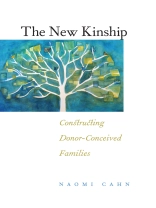No federal law in the United States requires that egg or sperm donors or recipients exchange any information with the offspring that result from the donation. Donors typically enter into contracts with fertility clinics or sperm banks which promise them anonymity. The parents may know the
donor’s hair color, height, IQ, college, and profession; they may even have heard the donor’s voice. But they don’t know the donor’s name, medical history, or other information that might play a key role in a child’s development. And, until recently, donor-conceived offspring typically didn’t know that one of their biological parents was a donor. But the secrecy surrounding the use of donor eggs and sperm is changing. And as it does, increasing numbers of parents and donor-conceived offspring are searching for others who share the same biological heritage. When donors, recipients, and “donor kids” find each other, they create new forms of families that exist outside of the law.
The New Kinship details how families are made and how bonds are created between families in the brave new world of reproductive technology. Naomi Cahn, a nationally-recognized expert on reproductive technology and the law, shows how these new kinship bonds dramatically exemplify the ongoing cultural change in how we think about family. The issues Cahn explores in this book will resonate with anyone—and everyone—who has struggled with questions of how to define themselves in connection with their own biological, legal, or social families.
Sobre el autor
Naomi Cahn is John Theodore Fey Research Professor of Law at George Washington University Law School. Her previous books include Red Families v. Blue Families, Test Tube Families (NYU Press 2009), Families By Law: An Adoption Reader (NYU Press 2004), and Confinements: Fertility and Infertility in Contemporary Culture.












